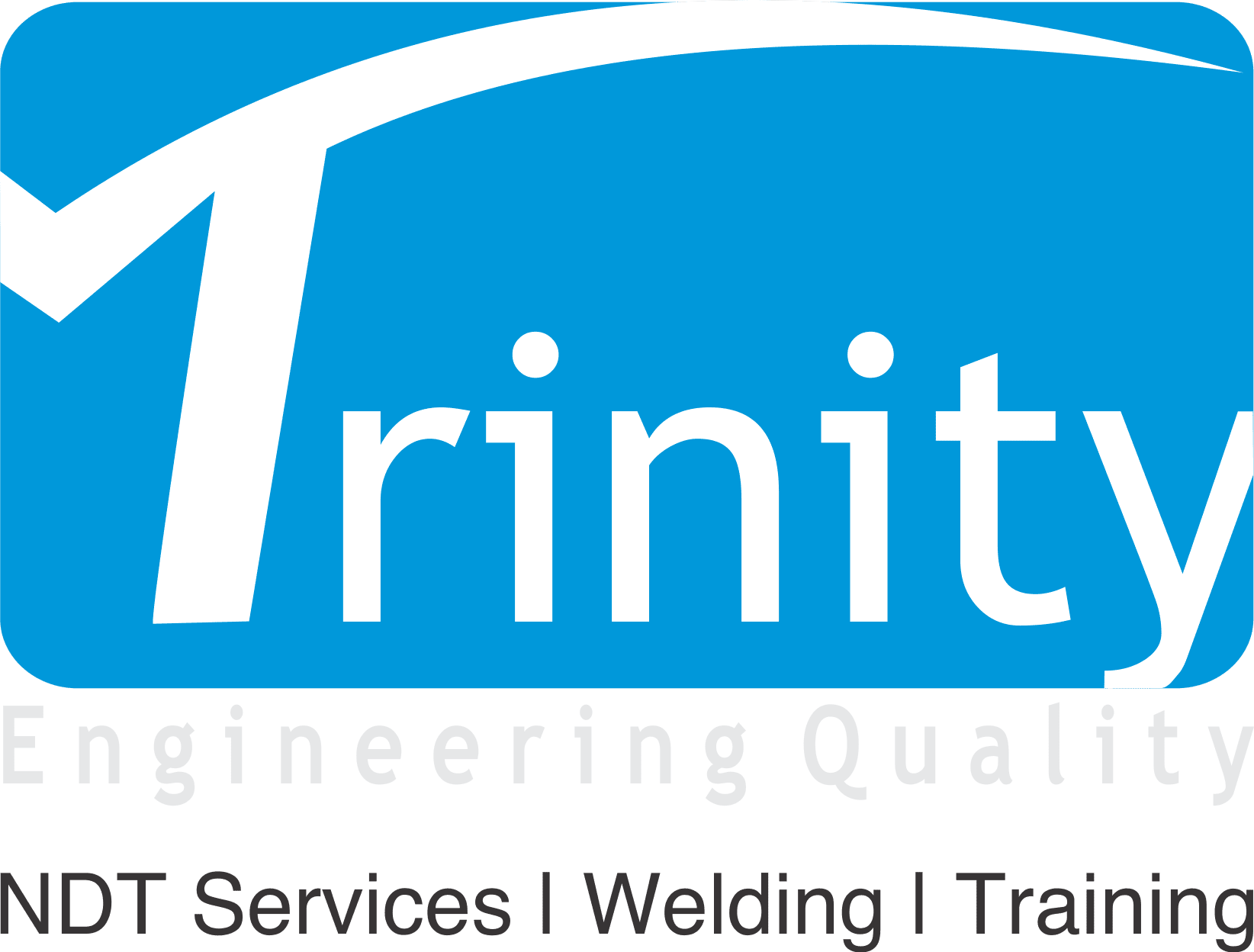Dye Penetrant DPT Testing Services. NABL Accredited Lab in India.
Fluorescent, visible, Onsite, In-lab Services. Experts in DPT Testing of Welds.
ISO17025 Accredited. Fastest, Cost Effective DPT testing in Bangalore.
Dye Penetrant Testing (DPT) testing Services in Bangalore. NABL Accredited Lab. Scope includes ASTM E165, ASTM E1417. onsite Services. ASNT, ISO9712, NAS410 Certified Personnel.
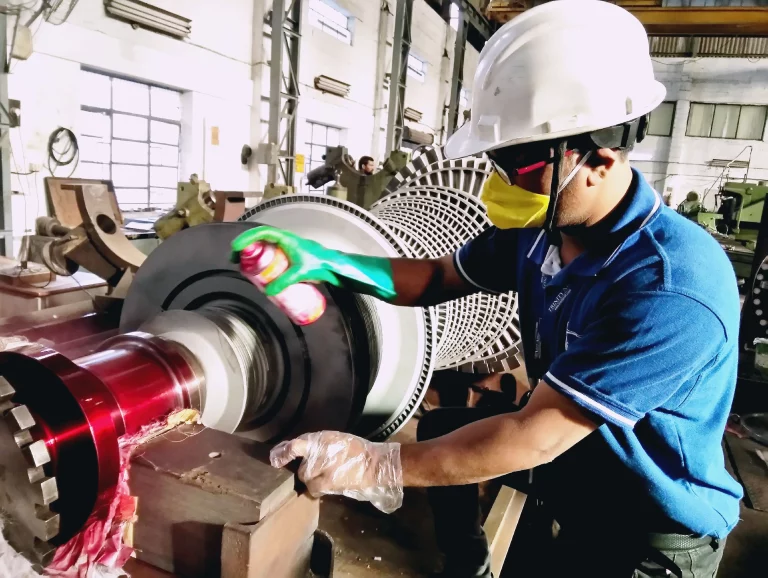
‘Trinity NDT – Testing Lab, is worldwide approved company for ‘Dye Penetrant Testing (DPT)’ services in Bangalore. An independent, NABL, NADCAP accredited as per ISO17025. In-house ASNT/NAS410 Level 3 with 25+ years experience. NABL Scope includes ASTM E165 and ASTM E1417. In lab services at Peenya Industrial Area in the state of Karnataka. Onsite services in India. A trusted third party inspection company for 1500+ clients. Team of technical experts who have two decades of experience. ASNT Level II, III and ISO9712 certified inspectors. Experienced technicians for welds, high altitude chimneys and oil, gas pipelines.
Our NDT facilities: Fluorescent penentrant inspection using water washable method ‘A’, post emulsifiable method ‘D’, solvent removable method ‘C’ techniques. Services as per ASTM E165, ASTM E1417, ISO3452. Developer types available with us: dry, non aqeous wet type. You may send components to our NDT Labs or you may invite us to do onsite testing any where in India. Onsite services are limited to red visible, fluorescent dye, method ‘c’ only.
Dye Penetrant Testing is also known as DPT testing or LPI. In aerospace, called as Fluorescent Penetrant Inspection, in short FPI testing. A non-destructive evaluation (NDE) method that finds flaws in welds and castings. Easy, cost effective for detecting surface opened defects for forgings, castings and welds. As there are no need for costly equipment, it is the cheaper to perform DPT testing. Highly sensitive method that detects smallest flaws which are otherwise not visible to naked eyes. Needs no much training for personnel. All that is needed is a cleaner, penetrant, developer, hand full of lint free cloth, a DPT level 2, 3 certified inspector.
To serve customers better, we have in-house ASNT NDT Level III experts. NAS410 Level 3 serves aerospace customers. ISO9712 Level 2 for testing as per ISO 3452. Ear marked areas for each DPT testing (type 1, type 2) techniques, using approved procedures.
Penetrant Types, Techniques, Sensitivities.
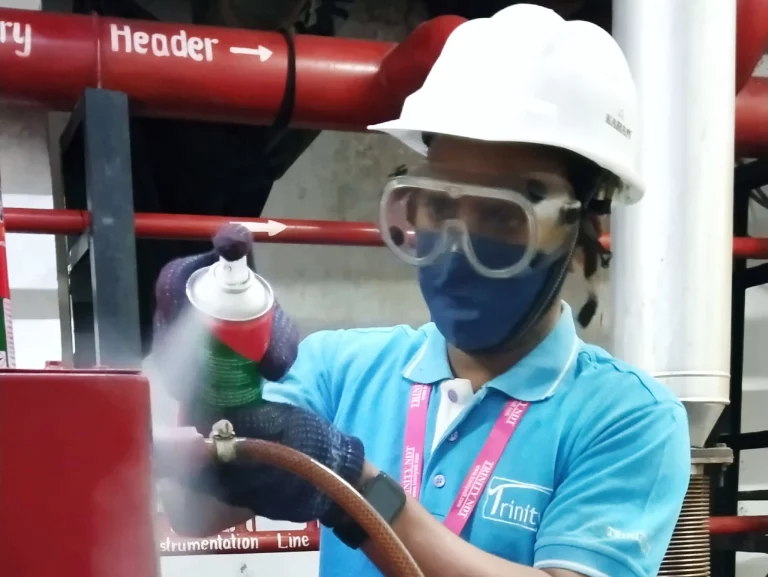
Though DPT testing looks simple, the test results may vary greatly based on techniques and sensitivity levels. Examination results may be poor if improper procedures are followed. For reliable results, needs ASNT/ISO9712 Level III approved NDT procedures.
As per ASTM E165 and ASTM E1417, there are two types of penetrants,
- Type 1 – Fluorescent
- Type 2 – Visible
Penetrants are then classified based on the method used to remove excess penetrant from the part.
The four methods are,
- Method A – Water Washable
- Method B – Post Emulsifiable, Lipophilic
- Method C – Solvent Removable
- Method D – Post Emulsifiable, Hydrophilic
Fluorescent penetrants are further defined by a sensitivity level category. Sensitivity is related to the brightness of an indication when measured with a photometer and compared to a standard. This is not applicable for visible red dye types.
There are five levels, in increasing order of sensitivity for fluorescent dyes:
- Level ½ – Ultra low
- Level 1 – Low
- Level 2 – Medium
- Level 3 – High and
- Level 4 – Ultra High
Note: DPT testing is not as simple as one think. To get proper results, it should be performed using right chemicals, procedures, experienced of Level II inspectors and other factors. Not everything you see at welding shops is right. Therefore, outsource your DPT testing to third party companies like ‘Trinity NDT’. We deliver results that meets international standards ASTM E165 and ASTM E1417.
Procedure for DPT testing
In general, penetrant inspection steps,
- Pre-cleaning
- Apply penetrant
- Dwell time
- Excess penetrant removal
- Drying the surface/s
- Developer Application
- Developing time
- Interpretation of indications
- Evaluate and record
- Post cleaning
Dry Developers are preferred for Aerospace NDT applications. At our DPT testing labs, Solvent removable, Wet Aqueous and Non-aqueous developers also available. Selection of penetrants, sensitivities, developers is based on client requirements.
NABL Accredited Lab in Bangalore
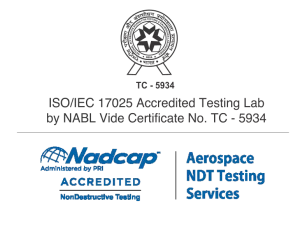
Our DPT test labs at Bangalore are NABL ISO17025 accredited for in-house, onsite inspections. Our systems meet international standards ASTM E165 and ASTM E1417. NADCAP accredited for aerospace FPI. Inspectors are trained to follow customer specific standard operating procedures (SOPs).
NABL scope: Fluorescent type 1, visible type 2, water washable, post emulsifiable, solvent removable penetrants. Sensitivity: S2, S3, S4. Need penetrant inspection services in Bangalore? Contact us.
Personnel with certifications: ASNT Level II, NAS410, ISO9712
Equipment: Stationery type unit and portable kits available. In-house ASNT Level 3, NAS410 Level 3 in penetrant testing.
Type 1, Method A, D using Stationery Equipment
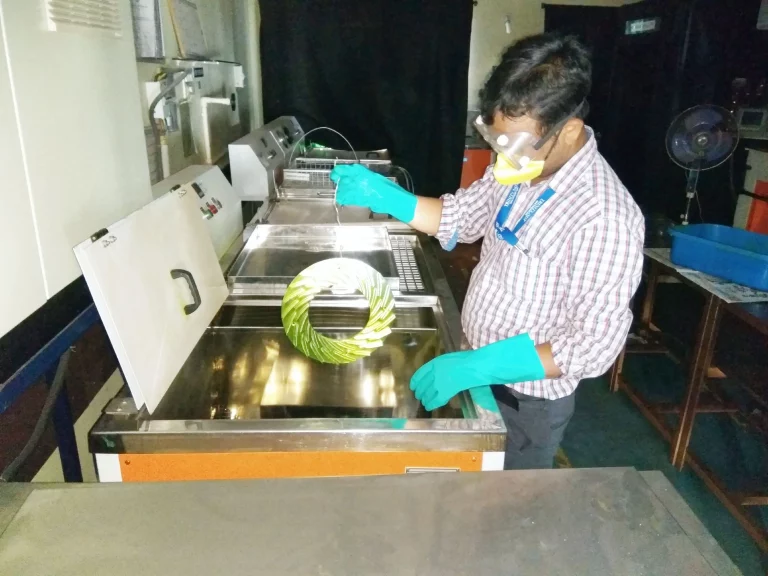
Stationery Penetrant Inspection line for aerospace customers. We are the best DPT facility at Bangalore in India. Pre-cleaning techniques available with us: Ultrasonic cleaning, alkaline cleaning and solvent cleaning. Parts sizes up to 600mm. Special zone for type 2, red dye penetrant inspection for smaller parts. A 5 Ton EOT crane for handling larger parts. Method A water washable, Method D post emulsifibale penetrants, S2, S3 & S4 sensitivity. Standards we follow: ASTM E165, ASTM E1417, ISO3452.
Inspectors who perform DPT testing are certified to ASNT Level II, ISO9712 and NAS410. An in-house ASNT Level III for approving procedures as per ASME, ISO standards. NDT Level IIs have over 20 years of experience in performing the inspections.
As a third party, Trinity NDT undertakes Dye penetrant testing both onsite and at our labs in Peenya, Bangalore. Experience in handling Welds, Pressure vessels, boiler parts, cross country pipe lines, Castings, Valves, gears, Turbine blades.
Our Aerospace FPI testing labs are approved from CEMILAC – DRDO organization – Government of India, Hindustan Aeronautics Ltd – HAL, L & T Aerospace and many more. Outsource your DPT Testing to us. We assure to deliver the best to meet your expectations in terms of on-time delivery at optimum cost.
ASNT Level III Consulting - Penetrant testing
Personnel with 25+ years of experience, in-house Penetrant Testing ASNT & NAS401 Level III. Every NDT procedure is duly reviewed, approved from company Level III. We prepare, approve NDT personnel Written Practice, establish techniques and setting up facility for clients in India.
Inspection personnel certified to Level III as per ASNT and NAS410. Know more about ASNT NDT Level III consulting.
Need consulting for personnel training on penetrant testing? Check details about DPT Testing Level II. Our training division, offers courses as per SNT TC 1A, ISO9712 and NAS410 for aerospace personnel
Need DPT Chemicals? We Stock and Sale in Bangalore
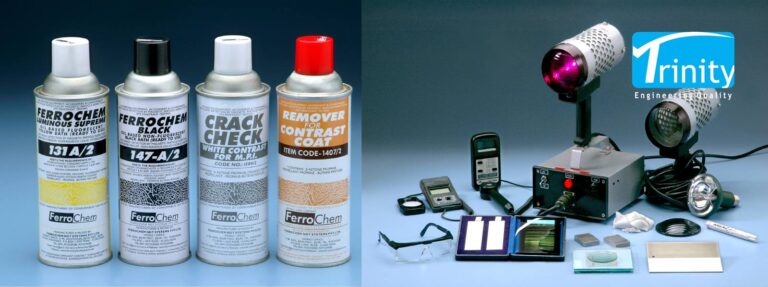
We supply Dye penetrant inspection, chemical kits for customers use at workshops. Dealer and stockist for DPT materials in the state of Karnataka. Authorised dealers for Ferrochem, make consumables. We stock at our labs in Peenya Bangalore and sells portable kits including penetrants, cleaners and developers. Available in aerosol cans and 5Litre cans. Before ordering, check with our sales teams for stock.
Also, stockists and dealer in Bangalore for MR Chemicals and Vector make Zchem, Crackchek branded penetrants. Supplies accessories such as aluminium cracked comparator blocks for DPT system checks. Test Kits can be hand picked from our office or couriered to your address anywhere in India. Easy access for customers in Hosur and Mysore stocked from Peenya Industrial Area, Bangalore.
Cost of DPT Chemical kit starts at Rs750/- + GST in Bangalore. Contact Trinity NDT – Sales Manager in Peenya today.
Contact us for your requirements about portable DPT chemicals in Bangalore.
Get Detailed Information on Liquid Penetrant Testing
Understanding the basics
Penetrant testing, also known as dye penetrant inspection (DPI) or liquid penetrant inspection (LPI), is a widely used method of non-destructive testing (NDT) to detect cracks, surface breaks, and other defects in various materials. This guide aims to provide a comprehensive understanding of the basics of penetrant testing, including the process, types, and applications.
Procedure for Penetrant Testing
- Preclean the part. Ensure that no dirt, grease, or any other contaminants are present that could potentially affect the results.
- Identify any visible defects or anomalies.
- Apply penetrant. Use methods such as spraying, brushing, or immersing the object in the penetrant.
- After suitable dwell time, remove excess penetrant.
- Apply developer. This final step helps to draw the liquid out and spread it over the surface, making it easier to see under UV light for fluorescent or visible light for red colour dye.
- Post clean to remove DPT materials from surface to avoid corrosion.
Types of Penetrant Testing
There are several types of penetrant testing, each with its own unique properties and applications. These include:
- Water-washable: This type of penetrant testing is easy to remove with water and is commonly used for large, non-porous components.
- Post-emulsifiable: This requires an emulsifier to be applied before the excess penetrant can be removed. It provides more sensitivity than water-washable penetrants.
- Solvent-removable: This type of penetrant is removed using a solvent. It’s typically used for small, intricate parts where water washing isn’t practical.
Applications
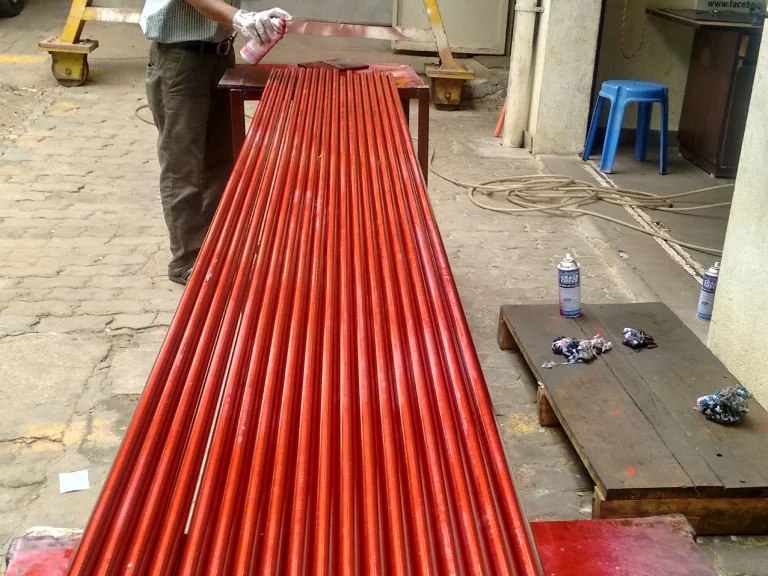
Penetrant testing is used in a wide range of industries and applications, including:
- Aerospace: To detect surface defects in aircraft components.
- Automotive: To check for cracks in engine components.
- Construction: To inspect welds on steel structures.
- Power generation: To identify defects in turbine blades.
In conclusion, penetrant testing is a highly versatile and effective method of non-destructive testing. By understanding the basics, you can better appreciate its value and potential applications in various industries. DPT is a reliable method for testing aerospace hardware. Aircraft components are routinely tested during MRO inspections to find fatigue cracks. Our Labs are specially equipped with NADCAP accredited FPI testing.
Codes and Standards
Even though there are numerous standards on PT testing, ASTM standards ASTM E 165, ASTM E 1417 and ISO3452 are widely recognized. Apart from this, ASME pressure vessel code Section V, API Codes, AWS codes, BS, EN standards provide procedures, personnel, equipment needs and acceptance criteria.
Trinity NDT – Testing Labs uses its ASNT and NAS410 Level III approved procedures that meets international standards, codes and customer specifications.
Key Highlights of facility
- Stationery penetrant inspection equipments
- S2, S3 & S4 sensitivity
- UV lights
- Professionals are qualified and certified to PT Level I, II as per Written Practice framed to the requirements of SNT-TC-1A, NAS410 & ISO9712
- Experienced in house ASNT NDT Level III consultants
- NDT Level III trainers for conducting NDT Level 1, 2 training and certification courses on Liquid penetrant testing.
- Skilled NDT Level 2 certified inspectors
- Sales and Supply of Dye penetrant inspection (DPT), penetrants, cleaners, solvents, developers
Training and Certification programs
Trinity Institute of NDT Technology (A training division of Trinity NDT WeldSolutions Pvt. Ltd) offers world class NDT training and certification courses that meets written practice and framed to the requirements of SNT TC 1A. Learn penetrant testing procedures at our upcoming DPT inspection Level II course. For the next schedule, visit Training Calendar page. Know about fee structure, eligibility criteria for the training courses and register online for the NDT Level II courses.
Participants from over 40 countries have benefited from NDT Level II courses offered as per ASNT SNT TC 1A and ISO9712. Read reviews on Youtube channel
Frequently Asked Questions (FAQ)
Liquid penetrant testing works on capillary action and blotting action. A penetrant applied to the surface enters into the surface openings such as cracks and blow holes, through capillary action. After excess penetrant removal, developer through blotting action, brings back the liquid on to the surface to produce indications.
DPT and LPT both are the same. Use of words depends on type of industry. Welding shops use Dye penetrant testing DPT whereas other workshops use LPT.
Dye penetrant testing suits to any material that is non-porous. For example: metals, non-metals such as plastics, glass, ceramics
Cost of DPT testing depends on technique, sensitivity, testing standard, location and other factors. Price of services in Bangalore starts from Rs.1000/- plus gst. Send us your query on whatsapp or call now, get instant quotation.
Yes. Trinity NDT, Bangalore in India, accredited from NABL for the scope of DPT testing as per ASTM E165 and ASTM E1417. Accreditation confirms to requirements of ISO17025 and NADCAP for aerospace components. Download scope.
